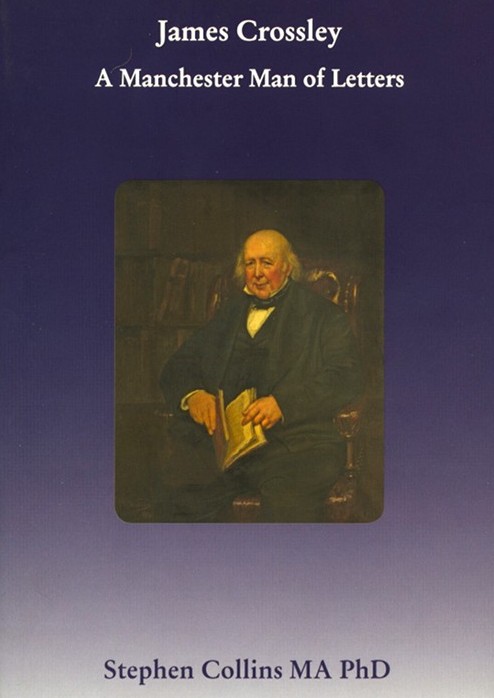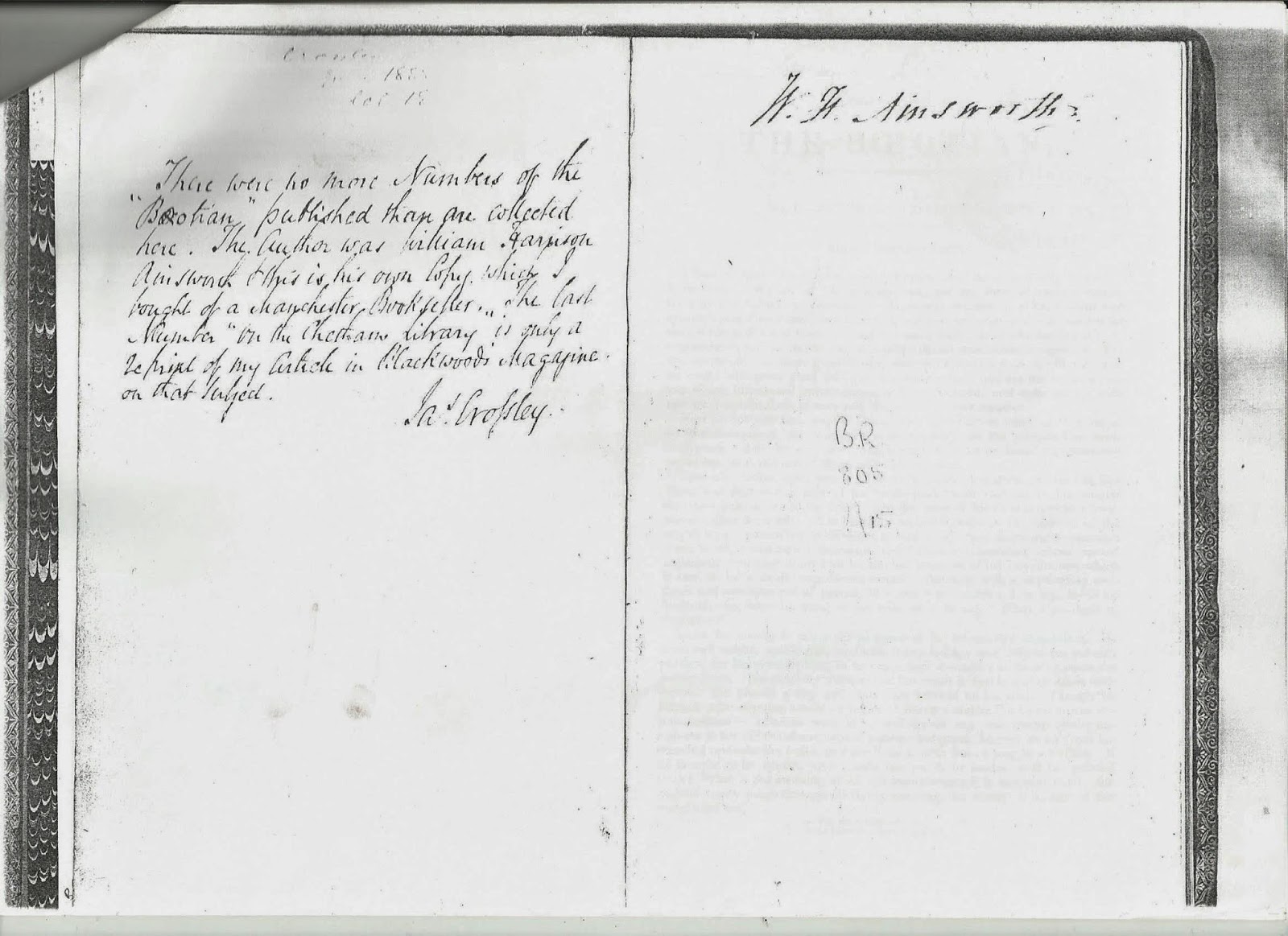Crossley wrote to his friend Canon Francis Raines, Chetham Society editor and Council member, on 23 August 1867, giving his opinion on the Reform Act of that year. This piece of legislation had been brought forward by Disraeli, then the Chancellor of the Exchequer in a minority Conservative administration led by Edward Stanley, the fourteenth Earl of Derby, whose son Edward Henry was also in Parliament at the time and was a keen supporter of Disraeli. In response to popular feeling, Derby is said to have suggested that 'of all possible hares to start, I do not know a better than the extension to household suffrage, coupled with plurality of voting.' An earlier bill introduced by Gladstone had failed, and by some adroit political manoeuvring Disraeli managed to beat Gladstone at his own game, enfranchising a larger portion of the population than even his rival had imagined. He gambled on the proposition that large portions of the working and lower-middle classes would vote Conservative, but predictably, this view was not shared by many in his party.
In Crossley's letter we see how a provincial dyed-in-the-wool Tory viewed the matter. The relevant part of the letter runs as follows:
The Reform Bill, which some respectable, but rather obtuse Baronet or member of Parliament is selected to do for a Bubble Company - to give plausibility to the scheme which a distinguished professor of Legerdemain ie, my friend Dizzy is making a job of. Alas! Alas! for the name of Stanley. He cannot look at you without being rebuked by the spirit of his great Ancestor ... The Monarchy is doomed.
Monday 27 October 2014
Sunday 3 August 2014
Did Hobbes squint?
In 1847, Horatio Rodd, an art dealer, approached Crossley with a portrait of Thomas Hobbes (1588-1679), the great philosopher and author of Leviathan. Crossley replied that 'Hobbes squints', which may have a been a stratagem for reducing the price, a practice for which our hero was notorious among booksellers.
He must have arrived at an agreeable purchase price because the portrait appears in Sotheby's sale of his effects in 1885, two years after his death, described as 'Portrait of Thomas Hobbes in gilt frame'. According to a pencil note on Central Library's copy of the catalogue, the selling price was £2-12/-.
Above is a portrait of Hobbes, which is unlikely to have been Crossley's, but gives a clear image of his features. What do you think? Is there any evidence of strabismus in this image of the great man?
He must have arrived at an agreeable purchase price because the portrait appears in Sotheby's sale of his effects in 1885, two years after his death, described as 'Portrait of Thomas Hobbes in gilt frame'. According to a pencil note on Central Library's copy of the catalogue, the selling price was £2-12/-.
Above is a portrait of Hobbes, which is unlikely to have been Crossley's, but gives a clear image of his features. What do you think? Is there any evidence of strabismus in this image of the great man?
Saturday 26 April 2014
Life at Booth Street in the 1830s
Crossley lived at Booth Street, Piccadilly, from 1820 to 1869 (see the Railway Menace post below), and during that long period he entertained a distinguished party of literary guests, including his lifelong friend William Harrison Ainsworth, Charles Dickens and Dickens's first biographer, John Forster. For a fuller description of this, see chapter 5 of James Crossley: A Manchester Man of Letters, where the cramped conditions of Crossley's accommodation are noted by Dickens after his visit in January, 1839. Despite this, our hero managed to live very comfortably, as the housekeeping accounts for 1836-8 show. These are among the Crossley MSS in Chetham's Library (ref: A.2.59), and below is a selection of entries which, judging by the hand and spelling, were probably written by the housekeeper:
Beef and Stake (sic) 4/4d, Wine glass 11d, Pies 1/3d, Beer [recurs many times] 2d - 2/2d, Shoes cleaning 8/-, A Fowl 2/-, A Rabbit 1/3d, Tea and Sugar 5/9d, Eggs 3d, Beef and Mutton 9/8d, Candles 2/-, Mending 1/3d, Bread and Milk 4d, Veal and Stake (sic) 5/3d, Pies and Puddings 1/6d, Butter, Potatoes etc., 3/11d, Lamb 3/6d, Nurce (sic) £1-4s-0d, Cook 6/0d, Waiter 5/0d [the last two probably for a special occasion such as Dickens's visit], Chickens 7/6d, Sugar and Tea 5/9d, Coffee 6d, Cowcum beer [cucumber?] 10d, Almonds and Raisins 1/6d, Strawberrys (sic) 1/4d, Porter 4d, Night coates (sic) 2/6d, Pepper and Mustard 1/-, Pork and Stake (sic) 4/3d, Apples and Onions 3d, Veal Pies 1/3d, Celery 6d, Ribbon shoe ties 1/3d, 16 weeks Lodging £16/16s/0d, Oysters 1/9d, Fowls 3/9d, lemons 2d, Coco (sic) 6d.
Beef and Stake (sic) 4/4d, Wine glass 11d, Pies 1/3d, Beer [recurs many times] 2d - 2/2d, Shoes cleaning 8/-, A Fowl 2/-, A Rabbit 1/3d, Tea and Sugar 5/9d, Eggs 3d, Beef and Mutton 9/8d, Candles 2/-, Mending 1/3d, Bread and Milk 4d, Veal and Stake (sic) 5/3d, Pies and Puddings 1/6d, Butter, Potatoes etc., 3/11d, Lamb 3/6d, Nurce (sic) £1-4s-0d, Cook 6/0d, Waiter 5/0d [the last two probably for a special occasion such as Dickens's visit], Chickens 7/6d, Sugar and Tea 5/9d, Coffee 6d, Cowcum beer [cucumber?] 10d, Almonds and Raisins 1/6d, Strawberrys (sic) 1/4d, Porter 4d, Night coates (sic) 2/6d, Pepper and Mustard 1/-, Pork and Stake (sic) 4/3d, Apples and Onions 3d, Veal Pies 1/3d, Celery 6d, Ribbon shoe ties 1/3d, 16 weeks Lodging £16/16s/0d, Oysters 1/9d, Fowls 3/9d, lemons 2d, Coco (sic) 6d.
Thursday 24 April 2014
Crossley's signature
In response to a query by Kate (see below under 'The Railway Menace' post), I'm attaching a scan of Crossley's signature. This is from a copy of The Boeotian, an extremely rare and short-lived journal by William Harrison Ainsworth, which is now in the archive of the Manchester Central Library. You will see that Crossley signs himself 'Jas Crossley' and uses the long first 's', in the eighteenth-century manner.
Incidentally, if you have any questions about James Crossley and his works, please feel free to contact me by email at stevecollins009@gmail.com
Incidentally, if you have any questions about James Crossley and his works, please feel free to contact me by email at stevecollins009@gmail.com
Subscribe to:
Posts (Atom)



